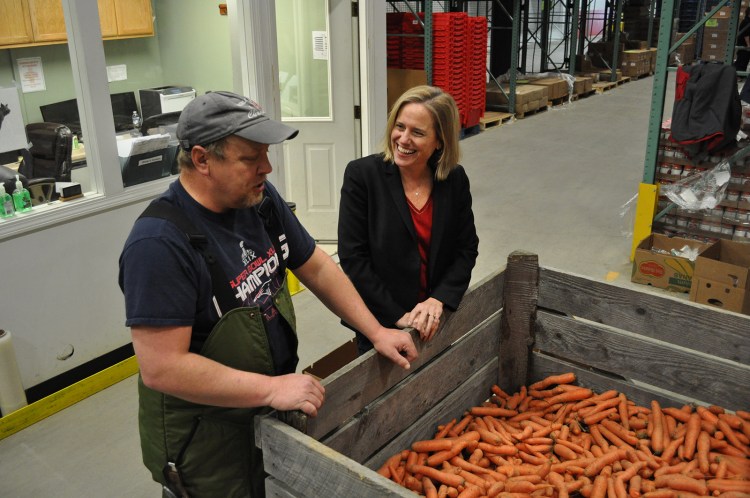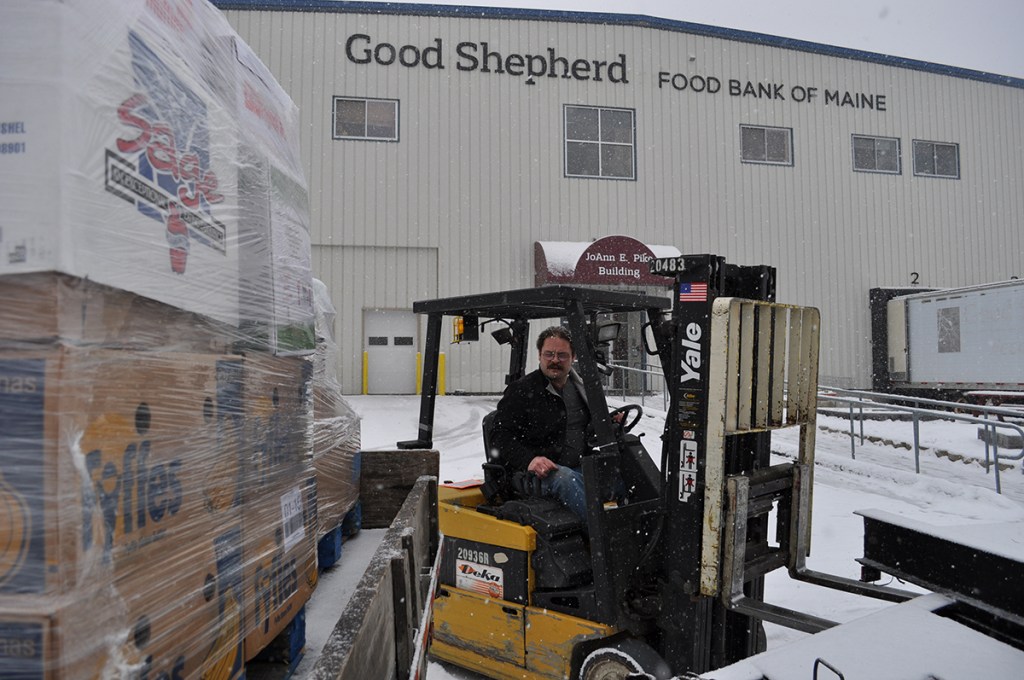At the holiday season, more than at any other, many people’s thoughts turn to charitable giving. It is after all the time, as Dickens said, “that want is most keenly felt.”
Too often in Maine, “want” takes the form of hunger, as Good Shepherd Food Bank President Kristen Miale well knows.
Does the food bank do anything special or different over the weeks from Thanksgiving to the new year?
“That’s a question we are often asked, and the answer is ‘no,’ Miale replied. “Because this time of year is no different than any other time. Hunger doesn’t take a holiday. It never stops.”
Over the course of a year, more than 178,000 people throughout Maine’s 16 counties receive food from Good Shepherd. The food the nonprofit distributed, channeled through its statewide network of more than 400 local partner agencies (pantries, meal sites, and schools), exceeded 23 million pounds in 2015.
According to USDA figures taken from U.S. Census research, food insecurity (defined as lacking “access to enough food to ensure adequate nutrition”) afflicts 15.8 percent of Maine households. The state is ninth in the nation in food insecurity. Maine and its children (one of every four of them is food-insecure) are first in New England.
“If anything, the (extent of the problem) is under-reported,” Miale said.
Good Shepherd, which operates as Maine’s sole affiliate with the nationwide Feeding America program, was founded in 1981. At that time, there was also greater concern about food waste.
“A food bank would take whatever was available or donated and distribute it. But so much of the food we produce in this country is not very good for you,” she said. “If people are getting by, but living off soda and ramen noodles, that is not food-secure.”
“So the issue becomes not people’s having access to calories, but having access to healthy food. And one of the effects of the problem is, when people are in poor health, their ability to make a living is compromised.”
A “shift in priorities” was called for. Today, the food bank’s primary mission is “to get healthy food to people in need,” Miale said. “We made a lot of investments both in purchasing food, and in our ability to store and distribute healthy food. Last year, we made a $1 million upgrade, adding three coolers to our Auburn cold storage facility. (A second facility is in Hampden.)
“Thanks also to our retail partners – food industry donors both national and within Maine – more than 50 percent of what we now distribute is fresh, and 37 percent of it is fresh produce. … We are buying produce from more than 65 Maine farms, and last season, invested more than half a million (dollars) in them, for a return of more than 2 million pounds of food.”
That investment also benefits Maine farm workers, of course. Good Shepherd, for its part, employs 62 people, “from warehouse distribution help to truck drivers and fund-raisers. … When you include the value of food, we are a $49 million organization, $9 million of that being cash operating budget,” Miale said.
Miale calls herself “a numbers person,” and before her Good Shepherd involvement had worked more than a decade in consulting, market research and financial analysis. Disheartened as she witnessed “the concentration of wealth in this country” during the recession almost a decade ago, she explored a career change, in part by volunteering at meal sites and food pantries.
“I didn’t know anything about how they worked,” she remembers. But those first-hand experiences dealing with hunger in Maine led her in 2010 to become director of Cooking Matters Maine, an educational arm of Good Shepherd. In September 2012, Miale became GSFB’s president.
Her 2017 goals for Good Shepherd relate to education, including working to change public assumptions about people who are food-insecure.
“There is so much inaccuracy about people living in poverty,” Miale said.
“I would like to see us do a better job of ’putting a face’ on the people we serve. No area of Maine is exempt. It’s one in three kids, in Washington County. In Kennebunk, 20 percent of children qualify for a free lunch.”
“The people we serve are your elderly neighbors who worked their entire lives and are now struggling because of rising property taxes,” Miale continued. “Or people working two or three jobs at minimum wage. Or people who have to decide: Do I want to buy food, or pay a medical bill, or buy heating fuel?”
It is a question too many Maine people will be asking this holiday month.
For more information on Good Shepherd Food Bank of Maine, or to make a contribution to its efforts, visit www.gsfb.org. Please note that a $25 donation provides 100 meals.
For a minimum $25 donation made by Dec. 15, you may also have a holiday card sent to a friend, associate or family member to show that a donation has been made on their behalf.
These monthly profiles are brought to you by Lee Auto Malls. The Lee family is committed to supporting local organizations that work to sustain Maine communities.
Send questions/comments to the editors.




Success. Please wait for the page to reload. If the page does not reload within 5 seconds, please refresh the page.
Enter your email and password to access comments.
Hi, to comment on stories you must . This profile is in addition to your subscription and website login.
Already have a commenting profile? .
Invalid username/password.
Please check your email to confirm and complete your registration.
Only subscribers are eligible to post comments. Please subscribe or login first for digital access. Here’s why.
Use the form below to reset your password. When you've submitted your account email, we will send an email with a reset code.